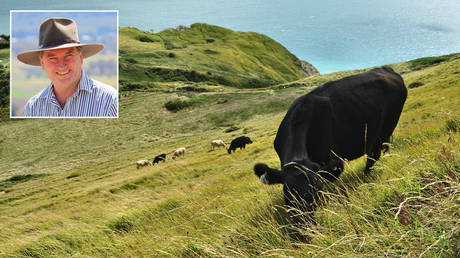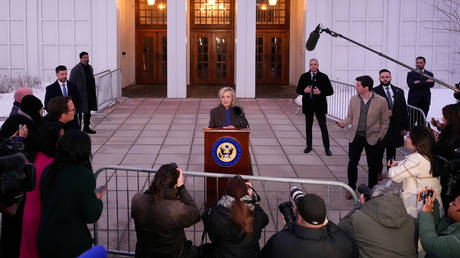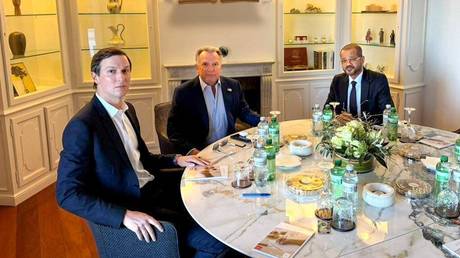
Australia’s Deputy Prime Minister Barnaby Joyce has said the country’s farmers would have to “grab a rifle” and shoot their cattle to curb methane emissions if the government’s ‘Net Zero’ plan did not have a livestock exclusion.
On Thursday, the National Party leader claimed he had wrangled a “carve-out” commitment from Prime Minister Scott Morrison to exclude agricultural methane emissions from the country’s 2050 emission reductions target. Joyce told reporters a US- and Europe-backed pledge for a 30% cut in methane emissions by 2030 – expected to be launched at the upcoming COP26 climate conference – would be a “disaster” for Australia’s beef, dairy and feedlot industries.
Earlier this week, Morrison released his government’s plan to reach net-zero emissions by 2050 and announced that Australia was on track to better its targets for the end of the decade. However, he has resisted calls to release details of the modeling basis for the plan – or reveal the terms of a reported deal to secure the National Party’s support.
But Joyce told reporters that his party – which is the junior partner in the coalition government – had been “absolutely explicit” that it would support the strategy only if any limit on methane emissions was “absolutely categorically ruled out.”
Noting that the party had secured the commitment through “diligent work” and “prudent oversight,” Joyce said it would offer the “insurance that protects regional industry, which underpins regional towns.” If the Nationals had “stood aside,” he claimed, angry farmers would have been “absolutely melting the phones down” since it affected their livelihood.
However, Morrison later dismissed his deputy’s claims, stating that negotiations with the Nationals had not influenced the government’s position on methane emissions. He insisted that Australia never had “any plans to sign up” to the ‘Global Methane Pledge’ – which had been a topic of discussion at a September meeting of major economies in which the country had participated.
“Under our plan, we won’t be putting any mandates on farmers, we won’t be targeting them in any way as part of our emissions reduction plan,” he said, adding that excluding the agricultural sector from “the revenue streams and the income sources” in the net-zero commitment would be a “great disadvantage.”
But Joyce had insisted his party had “absolutely, 100%” worked to convince the government.
“We went into a place where it wasn’t as clear and we made sure, absolutely, absolutely affirmed that that would be the case,” he said, claiming the exclusion would also extend to responsibility over “scope-3 emissions” of methane resulting from the export process.
Prior to this new back-and-forth within the coalition, Morrison’s net-zero plan has already prompted criticism over its lack of detail, ambition and credibility due to the lack of new policy announcements or legislation to achieve it. The government has also come under fire for refusing to rework its 2030 emissions reduction target of between 26-28% from 2005 levels.
Instead, it has reportedly released updated projections that show Australia will reduce emissions by between 30-35% compared to 2005 levels. A focal point of the UN climate summit is reducing global emissions by 45% by 2030 in order to limit rising temperatures to 1.5C by 2050.
If you like this story, share it with a friend!




